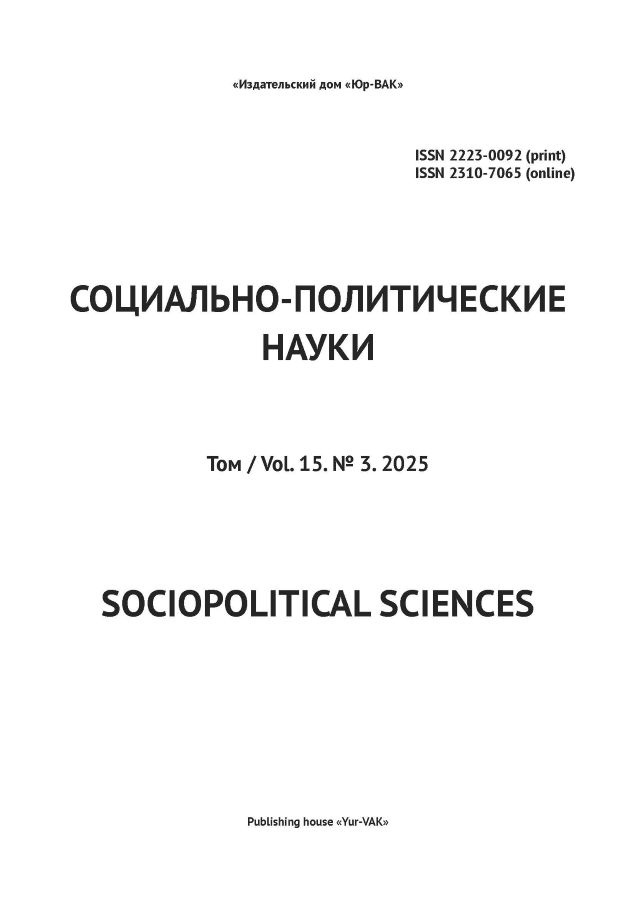Prospects for the Development of the Institute of Rehabilitation of the Disabled in Modern Socio-Economic Conditions
- Авторлар: Sabanov Z.M.1
-
Мекемелер:
- Khetagurov North Ossetian State University
- Шығарылым: Том 15, № 3 (2025)
- Беттер: 131-136
- Бөлім: Economic Sociology
- URL: https://journals.eco-vector.com/2223-0092/article/view/687896
- DOI: https://doi.org/10.33693/2223-0092-2025-15-3-131-136
- EDN: https://elibrary.ru/SEFAXM
- ID: 687896
Дәйексөз келтіру
Аннотация
The purpose of the research. This study examines the development pathways of the national rehabilitation system for people with disabilities in the Russian Federation. It analyzes rehabilitation science as an autonomous field of scientific inquiry, refining fundamental concepts and categories that reflect contemporary trends in integrated rehabilitation practices. Particular emphasis is placed on rehabilitation diagnostics, assessment of recovery potential, and state support mechanisms that facilitate social and economic integration of persons with disabilities. Results. The research findings demonstrate that rehabilitation science addresses multifaceted challenges – spanning medical, psychological-pedagogical, and vocational-social domains – while drawing upon advancements in natural, technical, and human sciences. This interdisciplinary foundation constitutes its defining characteristic. As an emerging academic discipline, rehabilitation science adapts methodological frameworks and tools from related fields while developing its own theoretical constructs, simultaneously exerting reciprocal influence on their evolution. This methodological synthesis has already made substantial contributions to medicine, education, sociology, architectural design, and ergonomics, where rehabilitation technologies have been effectively incorporated into core processes. A review of contemporary scholarship on disability rehabilitation underscores the imperative for further advancement and institutionalization of rehabilitation science as a distinct domain of scientific knowledge. Its conceptual framework should be grounded in a multi-tiered system of comprehensive interventions encompassing various life domains of individuals with special needs.
Толық мәтін
Авторлар туралы
Zaurbek Sabanov
Khetagurov North Ossetian State University
Хат алмасуға жауапты Автор.
Email: sabanovz@mail.ru
SPIN-код: 9767-4154
Cand. Sci. (Sociol.); Associate Professor at the Department of Pedagogical Education
Ресей, VladikavkazӘдебиет тізімі
- Begidov M.V., Begidova T.P. Social protection of the disabled. Textbook for academic baccalaureate. 2nd ed., rev. and add. Moscow: Yurayt, 2019. 98 p.
- Begidova T.P., Begidov M.V. Socio-legal and legislative foundations of social work with the disabled. Textbook for secondary vocational education. 2nd ed., rev. and add. Moscow: Yurait, 2022. 98 p.
- Kozlovskaya S.N. Modern trends in the development of the social protection system in Russia. In: Value orientations of youth in the context of modernization of modern society. 2024. Pp. 371–375.
- Kolesnikova G.I. The legal foundations of medical and social expertise. Textbook for secondary vocational education. Moscow: Yurait, 2023. 179 p.
- Kononova T.B. Theory and methods of social work: History of social work. Moscow: Yurayt, 2019. 356 p.
- Lipai T.P., Volkova O.A. Technologies of social work with the elderly and disabled. Textbook for students of secondary vocational education programs. Moscow; Berlin, 2020. 205 p.
- Nikiforova A.S. On the formation of the system of complex rehabilitation and habilitation of disabled people. In: Economics and law in the modern dimension: Issues of theory and practice. 2020. Pp. 105–112.
- Kholostova E.I. et al. Theory and methodology of social work. Textbook for vocational education. E.I. Kholostova, L.I. Kononov, M.V. Vdovina (eds.). 3rd ed., rev. and add. Moscow: Yurayt, 2019. 288 p.
- Kholostova E.I., Kononova L.I. Technology of social work. Textbook. Moscow, 2020. 519 p.
- Shaipova Ya.A. Interpretation of the concept of “disability”. In: Innovative mechanism for solving problems of scientific development. 2021. Pp. 193–196.
Қосымша файлдар








